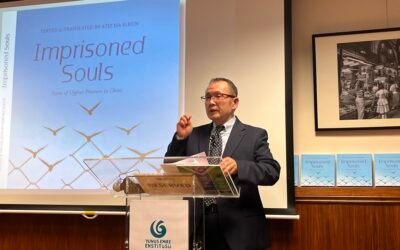December 10 is Human Rights Day. Bitter Winter celebrates it with four articles summarizing typical cases of violations of human rights in China. The first is devoted to religious persecution.
by Bitter Winter
- Ren Cuifang, a believer of The Church of Almighty God (CAG), was labeled by the CCP police as a “serious criminal” for her faith. At the age of 30, Ren was arrested on December 22, 2018, in Karamay city in the Xinjiang Uygur Autonomous Region and was savagely beaten by the police. On the 12th day of detention, the news came that she had died. After seeing her body covered in bruises and wounds, her family demanded an explanation. The police refused, and tried all possible ways to obstruct the family’s attempts to find out the real cause of Ren’s death. The family’s conclusion was she had been viciously tortured.

Ren Cuifang died at age 30, on the 12th day of her detention.
- Bitter Winter reports almost every day on the persecution of Uyghurs and other Turkic Muslims in Xinjiang. The long arm of the CCP extends to Kazakhstan, where ethnic Kazakh Muslims, who are Chinese citizens and managed to escape the dreaded transformation through education camps, are prevented from obtaining asylum by Chinese pressures on the local government.
But the persecution of Islam is not limited to Xinjiang. Around the country, mosques are transformed to look “more Chinese” and sometimes demolished or transformed into secular buildings.
In Guodian Town, administered by Xinzheng city in the central province of Henan, in mid-July a mosque was converted into a government agency building. Its case is not isolated.

The sign reading “Guodian Town Service Center for Party Members and Masses” was displayed above the entrance to a mosque in Guodian town, Henan, transformed into a government agency building.
Read the full text of the report.
- To eliminate religious belief, authorities in central China’s Henan Province are mobilizing the masses to report believers, a common practice during the Cultural Revolution. A Protestant believer in Henan’s Xiayi county in her late seventies, suffering from multiple diseases, was one of the victims. After she was discharged from the hospital where she spent a few days of treatment, her fellow believers from the village prayed and sang hymns for her. Unexpectedly, an informer recorded the believers praying and singing hymns, and reported them to the local government. The following day, four township officials came to the ill woman’s home to question her. The officials’ threats and intimidation frightened the woman, exacerbating her condition. She suffered trembling and spasms all over her body, and was unable to speak. In the following days, the government officials took turns intimidating and threatening her. As a result, the elderly woman suffered great psychological stress, and her condition worsened. She died on January 20, 2019, only five days after being discharged from the hospital.

The tomb of the believer who died after being harassed by authorities.
- Members of The Church of Almighty God, the most persecuted religious movement in China, are often tortured during detention. The police try to force them to disclose information about the Church or sign statements renouncing their faith. They are brutally tortured in a myriad of ways.
In October 2019, a nearly 60-year-old CAG believer from the eastern province of Jiangsu was subjected to electric shock torture. The police used electric batons to shock her armpits, legs, and feet, which resulted in dark burn marks on her feet. The woman was in so much pain that she screamed, but the police officers strapped her mouth with a strip of cloth and continued to torture her.

Darkened burn marks are still visible on the feet of the CAG member, who was subjected to electric shock torture.
- China Gospel Fellowship is a Henan-based network of house churches, and the movement has been under surveillance for an extended period. One hundred and fifty pastors, elders, and leaders from Henan Province’s China Gospel Fellowship planned to hold a year-end gathering at Haoyue Hotel on the morning of January 15, 2019. At just past 10 a.m., the deputy minister of Henan Province’s United Front Work Department (UFWD), accompanied by more than 150 special police officers, showed up at the hotel. During the raid, one pastor collapsed as he suffered a heart attack. Afterward, all the remaining pastors were taken away, each pressured into signing a “statement of repentance.”

Special police officers standing in three rows to block the entrance in front of Haoyue Hotel.
- Beijing municipality is implementing an operation to rid the city of all house churchesthat refuse to join the government-approved Three-Self Church. In early April, Wenxin Church, located in Qianhe Jiayuan Plaza in Beijing’s Chaoyang district, received a notice from the local Religious Affairs Bureau. It was requested to move out of the building before 10 a.m. on April 27, and remove the religion-themed paintings from the walls in the corridor outside the church. In addition, several other house church meeting venues situated in the Plaza were closed down one after another. The next day after the closure of Wenxin Church, a security checkpoint was installed at the entrance of Qianhe Jiayuan Plaza, registering every person who entered the building.

Wenxin Church was ordered to remove the religion-themed paintings from the walls in the corridor outside the church.
- To prevent members of state-approved Three-Self churches from practicing their faith, the CCP forces them to “donate” places of worship or seizes them forcibly, and even scams them into signing agreements to demolish their churches.
Less than two years after it was built, a Three-Self church in Wuzhi county under the jurisdiction of Jiaozuo city in Henan was destroyed on May 28 because the person in charge refused to sign an “unremunerated donation agreement.” Congregation members were afraid to say anything and watched as their church, built with the money donated by them – 3,000,000 RMB (about $ 420,000) in total – was razed to the ground.

A Three-Self church in Wuzhi county before and after it was demolished.
- Msgr. Shao Zhumin, the Catholic bishop of Wenzhou Diocese, detained repeatedly for his refusal to join the Patriotic Catholic Church, is under surveillance, forbidden to hold religious activities. October 4, this year, marked the 10th anniversary of the death of Lin Xili, the former Bishop of Wenzhou. Days before the anniversary, in late September, the national security personnel of Wenzhou city in the eastern province of Zhejiang took in Msgr. Shao for forced indoctrination. On October 4, over 500 law enforcement officers cordoned off the roads leading to Bishop Lin Xili’s tomb. Personnel were sent to keep watch inside the churches of surrounding areas to prevent congregations from holding Mass. Bishop Shao was not allowed to go back home until October 8.

The tomb of Msgr. James Lin Xili, the former bishop of Wenzhou.
- Since the start of the CCP’s nationwide campaign to eliminate large outdoor religious statues last year, important statues across the country continue to be targeted for destruction.
The two iconic Buddhist statues in the famous Yaowang Valley Scenic Spot in Beichuan county, under the jurisdiction of Sichuan’s Mianyang city, were demolished in late March 2019 on orders from the county government, which proclaimed that “the Buddhist statues were too tall and would affect the aerial photography.”
In May 2019, the Religious Affairs Bureau in Sichuan’s Mianyang city ordered the local Arhat Temple to remove the 500 Arhat statues at the temple’s expense, and build a cover to conceal the reclining Buddha sculpture, which is white in color and large in size.

An excavator is demolishing 500 Arhat statues around the reclining Buddha.
- On February 2, after a tremendous roar, a standing Guanyin statue, which was carved out of a cliff and knowns as the “Dripping-Water Guanyin” statue, was blown into pieces by the government officials in Pingshan county, under the jurisdiction of Shijiazhuang city in northern Hebei Province. To use explosives to demolish the Guanyin statue came, a source said, from a direct order issued from the CCP Central Committee.
Video: The process of using explosives to demolish the Guanyin statue
- The clampdown on Tibetan Buddhism is in full forcein the year marking the 60thanniversary of the Battle of Lhasa, which brutally ended Tibet’s autonomy and forced the Dalai Lama to exile. But the campaign against independent Buddhism is not limited to Tibet.
Two more Buddhist temples in the northern province of Shanxi succumbed to the CCP’s persecution.
Starting in March, police officers were stationed at Jixiang Temple, located on Mount Wutai in Xinzhou city of the northern province of Shanxi, preventing monks from traveling or holding religious activities and meeting with the Buddhists residing outside the temple. Pilgrims or tourists who visit the temple must have their ID information registered and face questioning by police.
Another temple in Xinzhou city’s Wutai county was forcibly demolished in the winter. One monk was arrested, while other believers and monks were dispersed.

A sign “Temple under Maintenance; No Admittance” was displayed at the entrance to Jixiang Temple.
- Taoism– one of the traditional Chinese Three Teachings, along with Buddhism and Confucianism – has also been unable to escape the CCP’s persecution.
In January 2019, the Religious Affairs Bureau of Lanling county, under the jurisdiction of Linyi city in the eastern province of Shandong, prohibited the Jade Emperor Palace, a Taoist temple, from holding religious activities, on the grounds of “not having a religious activity venue registration certificate.” In early May, the county’s Religious Affairs Bureau forcibly removed the signboard with the temple’s name above the door of the main hall. Inside the temple, the large incense burner was sealed off with sheets of galvanized iron, and statues of deities were blocked off with wooden boards, with propaganda slogans posted on them.

The signboard of Jade Emperor Palace has been demolished.



